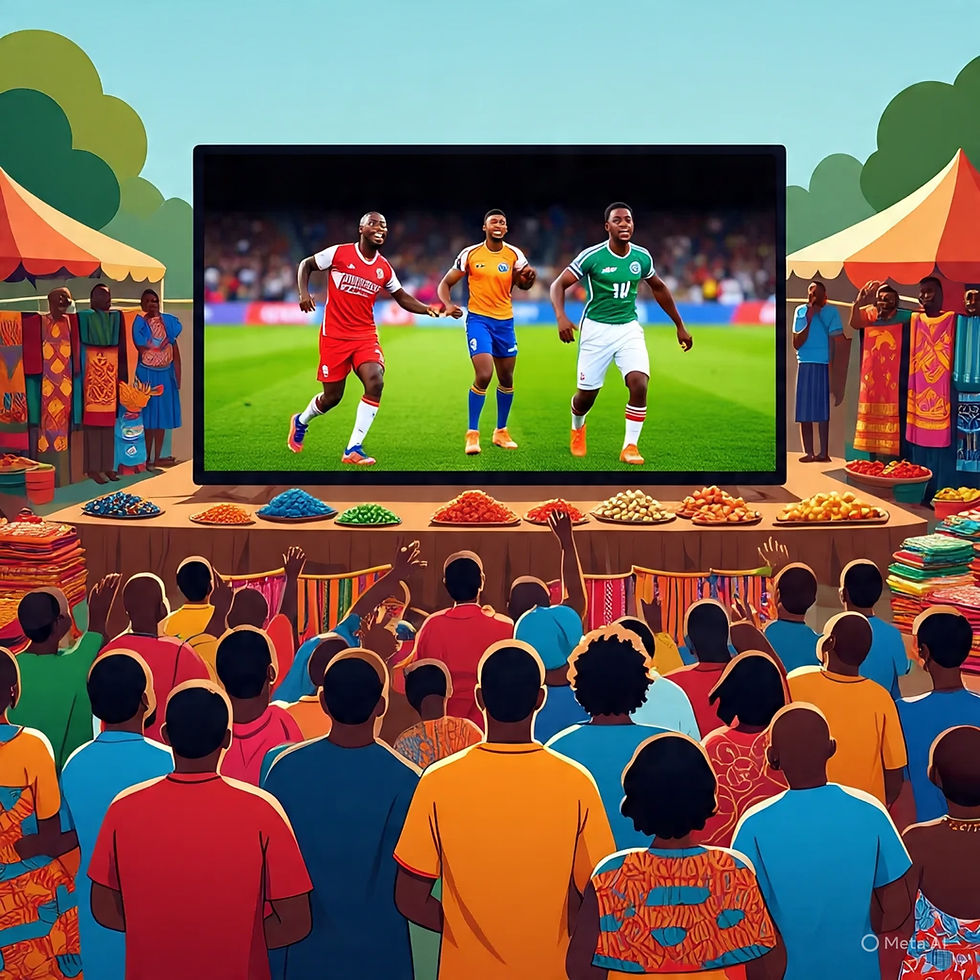Africa on Screen: A Deep Dive into the Past, Present, and Future of the African Movie Industry
- orpmarketing
- May 23, 2025
- 3 min read

Introduction
The African movie industry is experiencing a renaissance, emerging as a powerful force in global storytelling. This evolution—rooted in colonial resistance and shaped by digital innovation—has redefined how Africa is portrayed on screen. From the cinematic legacy of Ousmane Sembène to the global streaming success of Lionheart, Africa’s film industry is charting a bold path forward.
The Past: Resistance, Identity, and the Birth of African Cinema
African cinema emerged as a response to colonial domination and as a vehicle for reclaiming African identity and culture.
Key Moments & Milestones:
1955 – Afrique-sur-Seine: Widely regarded as one of the first films by African filmmakers, this short film by Paulin Vieyra and his colleagues laid the groundwork for postcolonial African cinema. [Source: Diawara, Manthia. African Cinema: Politics and Culture, Indiana University Press, 1992.]
1966 – La Noire de… by Ousmane Sembène: The first feature-length film by a sub-Saharan African director, exploring themes of colonial alienation and diaspora. [Source: Ukadike, Nwachukwu Frank. Black African Cinema, University of California Press, 1994.]
1969 – FESPACO Established: The Panafrican Film and Television Festival of Ouagadougou became the premier platform for African filmmakers. [Source: Official FESPACO website, www.fespaco.org]
These early pioneers created socially conscious cinema with limited resources, using film to challenge power structures and promote pan-African ideals.
The Present: A Digital Boom and Global Recognition
The digital revolution has democratized filmmaking across Africa, opening new avenues for storytelling, distribution, and entrepreneurship.
Leading Film Industries:
Nigeria – NollywoodWith an output of over 2,500 films annually, Nollywood ranks second only to India’s Bollywood by volume. [Source: UNESCO, The African Film Industry: Trends, Challenges and Opportunities for Growth, 2021.]Key figures include:
Kunle Afolayan – known for October 1 and Citation.
Kemi Adetiba – creator of King of Boys.
South AfricaKnown for its high-end production capabilities, the country hosts both local hits and international productions like District 9 and Mad Max: Fury Road. [Source: National Film and Video Foundation (NFVF), www.nfvf.co.za]
Kenya and Ghana
Wanuri Kahiu (Kenya) gained international acclaim for Rafiki, a groundbreaking LGBTQ+ love story. [Source: BBC, 2018 – “Kenya bans film ‘Rafiki’ for promoting lesbianism”]
Shirley Frimpong-Manso (Ghana) is a driving force behind Ghanaian cinema with films like Potato Potahto. [Source: CNN Africa, “Women behind Ghana’s growing film industry”, 2019]
Streaming and Global Platforms
The entry of streaming services into Africa is redefining distribution:
Netflix Africa: Launched in 2020 with original African content like Queen Sono and Blood & Water. [Source: Variety, “Netflix Launches First African Original Series”, 2020]
Showmax: A regional leader with original productions and sports streaming.
IrokoTV: Dubbed the “Netflix of Africa,” it offers Nollywood content globally. [Source: Forbes, “IrokoTV: Building the Netflix of Africa”, 2013]
The Future: Global Integration and Cultural Power
Emerging Trends
International Collaborations
The Woman King (2022), filmed in South Africa, starred Viola Davis and spotlighted African women warriors. [Source: New York Times, “How ‘The Woman King’ Found Power in Numbers”, 2022]
Youth-Driven Digital ContentAfrica’s median age is under 20, and creators are innovating across YouTube, TikTok, and Instagram. [Source: United Nations, World Population Prospects, 2022]
Policy & Funding Support
Rwanda launched a film fund in 2021 to boost production. [Source: Rwanda Development Board]
Senegal opened the Dakar Creative Hub with support from UNESCO and the EU. [Source: UNESCO.org]
Genre Expansion
Sci-fi: Hello, Rain by C.J. “Fiery” Obasi, based on Nnedi Okorafor’s Afro-futuristic story. [Source: OkayAfrica]
Animation: Disney+’s Kizazi Moto: Generation Fire highlights pan-African sci-fi storytelling. [Source: Variety, 2023]
Horror: His House by Remi Weekes explores the trauma of African refugees. [Source: Guardian UK, 2020]
Key Players to Watch
Genevieve Nnaji (Nigeria) – Lionheart (2018) became Netflix’s first original Nigerian film. [Source: CNN, “Genevieve Nnaji makes history”, 2018]
Michaela Coel (Ghana/UK) – Her BAFTA-winning work (I May Destroy You) has redefined storytelling in the diaspora. [Source: The Guardian, 2021]
Jahmil X.T. Qubeka (South Africa) – Known for Sew the Winter to My Skin, a visually rich apartheid-era drama. [Source: TIFF, 2018]
Conclusion: A Cinematic Revolution in Motion
Africa’s movie industry is undergoing a cultural and economic transformation. From its revolutionary roots to a globally connected future, African cinema is reclaiming narratives and opening new possibilities. The next decade will likely see Africa not just participating in global cinema—but leading it.
"Africa is not a country, and its cinema is not a genre. It is a universe of stories waiting to be told, with vision, vigor, and volume."




Comments